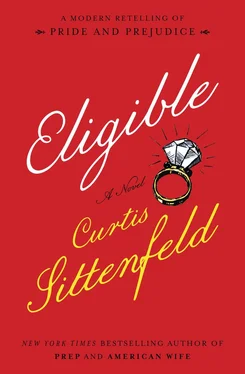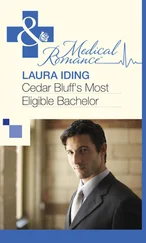“I WAS UNDER the impression that this was a terrible show,” Darcy said seven minutes into Eligible: Chip & Jane’s Road to the Altar. “But it’s literally unwatchable.”
“Not literally,” Liz said. “Your eyeballs aren’t melting.”
They were curled into each other on the couch, a blanket spread over them; it was early April and still cool in Cincinnati.
With his fingertips, Darcy pulled down the skin around the sockets of his eyes. “Are you sure?”
“I’ll make you a deal,” Liz said. “If you promise to stick with it for the next three nights, I’ll never try to get you to watch Eligible ever again.”
Darcy grinned. “Do you think that’s tempting? It’s not like I’m obligated to watch anyway.”
“You kind of are,” Liz said. “Because you’re in it, and so am I, and we’re the loves of each other’s lives.”
Darcy leaned in and kissed her. “We are the loves of each other’s lives,” he said. “But that has nothing to do with Eligible. ”
What Liz didn’t yet know, but would discover imminently, was that the humiliation of Eligible: Chip & Jane’s Road to the Altar belonged primarily to her. She, her sisters, and Chip’s sisters would all appear onscreen with chyrons showing not only their names but also — perhaps in the interest of distinguishing this bevy of women — their identities, or some stereotypical version of their identities bestowed with minimal regard for fact. Brooke Bingley was “The Stay-at-Home Mom,” which was accurate enough, but Caroline Bingley was “The Romantic.” Lydia Bennet was “The Free Spirit,” Kitty was “The Entrepreneur,” Mary was “The Scholar,” and Liz (oh, how this stung!) was “The Party Girl.” Shortly after a clip in which Kitty declared, “What I’m really interested in long-term is opening a chain of salons that cater not just to physical beauty but also to inner well-being,” Liz showed up saying, “I’d describe myself as a focused, down-to-earth person,” and there ensued a montage of her gulping wine, pounding shots, and at one point not just holding but drinking from two separate champagne flutes. Which had actually happened at the wedding reception, but only because she’d picked up a glass for her mother as well as herself, her mother’s had been excessively full, and Liz had been trying to prevent it from spilling.
Naturally, the confrontation she’d had with Caroline appeared in its entirety, contextualized in advance by Caroline trashing Liz during multiple interviews and describing with surprising frankness, if a delusion could ever be called frank, her belief that she and Darcy were meant to be together. A camera crew had, albeit without sound and from a distance of perhaps forty feet, caught Liz’s proposal to Darcy and their subsequent embrace; both were interspersed with Caroline crying furiously, as if she were observing the scene firsthand, which Liz strongly doubted had happened. But maybe weeping on-camera had been the price Caroline was required to pay in order to become the star of the next season of Eligible; the announcement of her role, reflecting the first time in Eligible history that a sibling pair had starred one after the other, would come the following week.
Liz had assumed she wasn’t interesting enough to warrant a prominent role in the wedding special, given that she was pushing forty, was in neither a transgender nor even an interracial relationship, and didn’t don a bikini. That she’d been mistaken might have been flattering if it weren’t so embarrassing.
“I don’t think I can ever leave this apartment again,” she would tell Darcy. “Aren’t you mortified that people will know you’re engaged to the Party Girl?” (They were to marry in August at Knox Church. They’d considered holding the ceremony at Pemberley, just before the estate was passed off to the National Trust for Historic Preservation, but Liz had reasoned that it was her mother who cared most about the proceedings, and due to a once-unimaginable confluence of circumstances, Liz found herself the daughter best suited to making Mrs. Bennet’s every wedding dream come true. So why not?)
Darcy would look amused. He’d say, “Who cares what anyone thinks?” He’d kiss Liz’s forehead and add, “Besides, who wouldn’t want to marry the Party Girl?”
IT WAS MARY’S firm belief that any woman capable of satisfying her own desires — which, though not all of them knew it, was any woman anywhere — would never need to disgrace herself in the pursuit of a man. The nine-inch dildo Lydia had boasted of sounded garish, but after experimenting over the years, Mary had settled upon a sleek and ergonomic vibrator with five modes of stimulation, powered by an almost silent motor. She used it nightly before bed, and sometimes in the morning as well, after her alarm went off for her job as a sales account manager at Procter & Gamble.
For her undergraduate degree, Mary had attended Macalester College, where she had been involved, sequentially, with two men and one woman, and the collective lesson she had learned from them was that she cared little for sex and even less for sharing a bed. Back then, before hookup websites became common, physical intimacy involved such rigmarole — you might start on meals and conversations with someone weeks or months prior to them providing you with any true gratification, and even then, gratification wasn’t guaranteed; it was all incredibly inefficient. As for sharing a bed, the other person’s snores and blanket hogging, the small talk you needed to make when going to sleep or waking up — really, what was the point? Mary preferred to spread out alone on a mattress, turning the light off or on when she pleased.
Explaining her view to her sisters, or to anyone else, was out of the question. Everyone she knew was preoccupied with coupling, either for themselves or for others, and Mary understood that trying to persuade them would be an exercise not only in futility but also in tedium. (And with regard to exercising: That was something else Mary didn’t do, nor did she diet, shave her legs or underarms, pluck her eyebrows, or wear makeup. She showered daily, brushed her teeth, and applied deodorant, a routine she deemed more than adequate in terms of holding up her end of society’s hygiene bargain.)
Though Mary knew that her sisters considered her strange, and would consider her more so were she to articulate her true outlook, she observed with a nearly anthropological derision their elaborate fitness rituals and fakely scented lotions and the hours — nay, years — they devoted to making some man see them in a particular way; they reminded her of plastic ballerinas inside music boxes, twirling in their private orbits of narcissism.
She did not detest her sisters, she did not consider them evil — certainly shallow, but not evil — and yet if she weren’t related to them, she wouldn’t spend time in their company. Then again, she wouldn’t spend time in the company of most people.
Even the members of her bowling league, who were the closest approximation Mary came to a community, weren’t individuals she saw except on Tuesday nights. Mary’s team consisted of two other women and two men, and the next youngest person after her was eighteen years her senior. Among their appealing qualities was that Mary stood no chance of encountering any of them at the Cincinnati Country Club.
Really, it was the sport rather than the people that drew Mary week in and week out to Madison Bowl. Every time she entered the building, with its scent of gymnasium and french fries, its rhythmic knocking of heavy polyurethane against wood, excitement activated her salivary glands.
Читать дальше
Конец ознакомительного отрывка
Купить книгу












